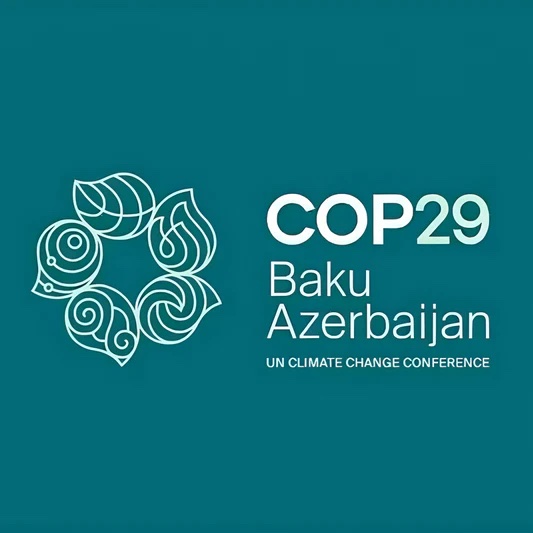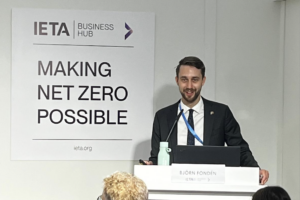COP29 update: Day 3, 13 November

Greetings from Baku!
COP29 moved into high gear on Wednesday. The delegation pavilions were more crowded, the noise level rose several notches – kudos to the many delegations who are issuing headsets to their side event audiences! – and the lines at the coffee outlets just kept getting longer.
While the leaders’ summit continued in the background, Wednesday was when negotiators got down to the tasks at hand.
The mainstream talks in the CMA focused on the New Collective Quantified Goal on climate finance. The co-facilitators of these negotiations, Yasmine Fouad of Egypt and Chris Bowen of Australia, had prepared a nine-page draft text before the start of COP, but after an early session yesterday, they were asked to reinsert many original proposals to reflect all Parties’ views and proposals.
Inevitably, the updated document presented this morning was a hefty 34 pages of heavily bracketed text. Among the many brackets were options for the total sum to be raised and mobilised: the choices range from $100 billion+ to $2 trillion. We understand the G77 and China group proposed a $1.3 trillion+ figure.
Parties reflected on the contents and, just as inevitably, asked the co-facilitators to streamline the text. A new NCQG draft will arrive tomorrow for further discussion.
Meanwhile, the aftershocks of this month’s US presidential election continue to reverberate around Baku’s curiously-named Olympic stadium. This morning the High Ambition Coalition of 25 nations issued a statement to reiterate its support for the COP29 process, and to make the point that the election of Donald Trump “would not put a stop to the process that’s underway”.
Ireland’s environment minister Eamon Ryan put it succinctly: “Whatever one country does, the Paris Agreement still lives, it’s still strong, it’s actually delivering for countries because it is the way forward to a better economy. And any country that might want to veto or opt out I think will come back because they’ll realise they’re falling behind, they’re missing out on the new economy to come.”
And another similar view came from a surprising quarter; Exxon Mobil’s CEO Darren Woods told the Wall Street Journal overnight that Donald Trump should keep the US in the Paris Agreement.
“I don’t think the stops and starts are the right thing for business,” the Journal quoted Woods as saying. “It is extremely inefficient. It creates a lot of uncertainty.”
Finally, in what may not be totally unrelated news, we’re expecting some turmoil tomorrow in the wake of reports late on Wednesday that Argentina’s president Javier Milei has ordered his negotiators to leave COP29. No reason was given in the reports, but the country’s president has previously called the climate crisis “a socialist lie”, and closed down Argentina’s environment ministry not long after being elected.
IETA COP29 Nightcap Party

This year’s IETA Nightcap Party takes place on Friday November 15. Tickets for the event are on sale here, and the event location will be shared along with your receipt. Hangover cure optional and not endorsed by IETA.
In the negotiations
As we reported in yesterday’s update, Article 6.2 negotiations resumed on Tuesday in a contact group and continued today to pick up discussions on a number of key issues.
Many of these agenda items will be familiar. Authorisation remains a critical point, since it also covers the vexed question of revocation of authorisation, but there is also discussion on whether the Centralised Accounting and Reporting Platform should store all the LOAs in a publicly available format
Another big sticking point in 6.2 is the question of the international registry. There’s an underlying question of what the nature of this registry is – is it a fully-fledged transactional registry or just a repository of aggregate amounts reported by Parties? Some Parties such as Singapore and Japan proposed to analyse in more detail what the diverging views among Parties are on functionalities and features.
This has a spillover effect into the Article 6.4 workstream, because delegates need to agree on the details of the connection between the 6.4 mechanism registry and the 6.2 registry; and this can’t be agreed until the nature of 6.2 registry itself is agreed.
Parties are still haggling over the definition of a “cooperative approach”. We had thought this issue had been dropped after Bonn, but it was discussed again on Tuesday night. Proponents of a definition are seeking to prevent unilateral authorisation: in their view, both a buyer and a seller need to be involved for an ITMO to be authorised.
The EU came up with a bridging proposal yesterday, which would require authorisations for NDC use to identify an acquiring Party, and authorisations for other purposes such as CORSIA to identify an acquiring entity. But this still doesn’t seem to satisfy the needs of a well-functioning market. Does it mean that a final user needs to be identified at the start of any activity?
Another item needing attention is the Agreed Electronic Format (AEF), the template that Parties will use to submit annual information. There are divergences between whether the AEF should be adopted or not, with the Arab Group expressing a preference for more testing.
Parties are discussing how these reports submitted by Parties should be reviewed. There are many different proposals and positions on how, and in what order, the reviews should be carried out, and whether countries need to wait for approval of their initial report before they can authorise ITMOs.
This discussion is often referred to as “sequencing”. The EU keeps pushing for it but signalled “flexibility” if greater “upfront transparency” can be achieved through other provisions. The Like-Minded Developing Countries group and Pakistan were vocal that the quest for transparency should not limit the possibility of developing countries engaging with the mechanism.
Finally, Parties are seeking to establish a procedure for when the review process identifies ITMOs as being “inconsistent”. It has previously been agreed that “persistent” and “significant” inconsistencies would require some intervention – but there is no consensus on how to define these terms and what measures should be taken against these ITMOs, since the Paris process doesn’t have top-down enforcement.
The Article 6.4 talks got underway this evening, as the contact group met to map out its work plan for the remainder of this COP.
In addition to the few outstanding items on the agenda from last year, such as the connection between the 6.4 mechanism registry and the international registry, and some authorisation issues specific to 6.4, Parties were allowed to provide further inputs to mechanism methodologies (including for removals).
While some Parties expressed satisfaction with the work of the Supervisory Body and the endorsement in the opening CMA plenary, others highlighted concerns about the approach adopted and the precedent it creates, recommending material changes to the recently adopted standards as well as some aspects of the COP26 decision. Let’s hope this will not open a can of worms and undo the early progress achieved in Baku!
Our international policy team believes the broad structure of Article 6.4 has now been established, and that the Supervisory Body can start approving methodologies, starting with adapting some Clean Development Mechanism methodologies.
Earlier in the year the SB carried out some consultations on selected CDM methodologies such as renewable energy and use of biomass waste gases, so these are likely to be the first to be approved and become Article 6.4 methodologies.
Wednesday at the IETA Business Hub
It’s always a great pleasure to see how busy the Business Hub is at COP, and this year is no exception. Even though a number of people have observed that it’s too easy to become totally lost in the aircraft hangar that is Area E, and that you have to go as far as Turkey – or their pavilion at least – to find the exit, it’s gratifying that so many people have found their way here in search of coffee or just a seat to recover from their travels.
The main IETA event on Wednesday was the launch of our Article 6 Business Pulse survey in conjunction with the Article 6 implementation Partnership. The survey delves into private sector opportunities, implementation challenges, and the role of Article 6 in voluntary and compliance markets.

IETA’s Björn Fondén presented the findings of the IETA-Article 6 Implementation Partnership business pulse survey on Article 6.
The key finding of the survey is that 83% of respondents would be willing to pay higher or even much higher than average market rates for correspondingly adjusted ITMOs, as well as for non-adjusted 6.4 Mitigation Contribution Units (MCUs).
Soberingly, more than 70% of respondents said that the uncertainty of guidance from the UNFCCC negotiations is the key obstacle for effective implementation of Article 6.
The survey also revealed that projects in the areas of sustainable agriculture, Afforestation, Reforestation and Revegetation (ARR), carbon dioxide removals (CDR) and household devices in South and East Asia, South America and Africa were of highest interest, whereas REDD+ projects garnered the least interest from developers and buyers alike.
Thursday at the IETA Business Hub
Many of the events hosted at the IETA Business Hub will be webcast – just click on the links to participate! All event times are listed in Azerbaijan time (AZT), which is three hours ahead of Central European and two hours behind Singapore time.
IETA’s BusinessHub is located in Area E, Pavilion H6, in the Blue Zone. We’re close to the pavilions of Georgia, Moana Blue Pacific alliance and Namibia.
Thursday’s agenda opens at 0930 AZT (0630 CET) with a session organised by Carbon Finance Lab, which will discuss a modular “plug-and-play” approach for CCS project activity. Virtual participation will be possible by joining the event here.
Carbon Finance Lab is also hosting the second side event at 1030 AZT, which brings together leading international carbon crediting standards that have formed a collaboration to enhance transparency and consistency to help scale, and channel VCM finance flows in the Global South. You can watch this event here.
At 1130 AZT, the Global CCS Institute will present a session on financing carbon management projects. Join the discussion here.
And at 1215 AZT, the GCCSI will host a discussion on scaling up CCS in the global south. Watch it here.
At 1300 AZT, IETA will host an event that examines the challenges that corporates face in setting targets and building frameworks to work towards net zero. The event can be watched virtually by joining here.
At 1430 AZT the focus switches to adaptation. Value Network Ventures will present a session looking at how to make markets work for adaptation. Follow the proceedings online here.
The Edison Electric Institute comes to the Business Hub at 1530 AZT to host a discussion on the challenges in meeting increased electricity demand while also meeting decarbonisation goals and maintaining affordability and reliability. Watch this here.
The final event scheduled for Thursday is at 1700 AZT, and is organised by Peru’s Environment Ministry. Speakers will discuss nesting frameworks and approaches, and you can watch this by joining the virtual session here.